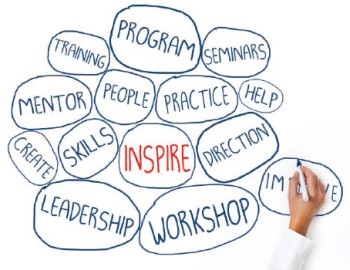Teaching Golf Skills Is Only One Piece of Being a Good Teacher or Coach
 I spend a fair amount of time talking with clients about their teachers and coaches and their impact on the clients’ performances. Outside of golf, it’s sad to say, many athletes do not have positive experiences with teachers and coaches. Why?
I spend a fair amount of time talking with clients about their teachers and coaches and their impact on the clients’ performances. Outside of golf, it’s sad to say, many athletes do not have positive experiences with teachers and coaches. Why?
Teachers and coaches aren’t necessarily chosen to teach and coach because of their fabulous people skills. Similar to other jobs, where people are hired to do a job for their technical skill and ability and their experience, teachers and coaches are no different. This does not mean that some teachers and coaches don’t have the ability to be personable, caring, and supportive, but it does mean it’s more than likely not the case. Olympic, professional, and elite teachers and coaches get paid to bring home the money or the gold, which again does not mean they necessarily have to be personable. Don’t get me wrong; we need teachers and coaches with technical skill and ability. However, we also need teachers and coaches who understand how to work with people. It is possible to be a teacher and coach with both skill sets. Not only is it possible, but it’s important.
If you don’t develop relationships with your players, then you aren’t going to be able to help them with the really diffi cult part – the mental game. Golf is largely mental, and if you are only spending time on the mechanics of golf, your players are missing out. Like you, they will attribute slicing and missing putts to not practicing enough, when that is more than likely not the problem. Many of the golfers I’ve worked with have practiced so much it was as if they had a part-time job alongside their full-time job. After
our work together, golfers realize that they don’t need to (necessarily) train longer, but they need to train mentally.
As teacher and coach, you know how mental golf is…why don’t you address it? Fear is probably the biggest reason. For example, a teacher or coach may ask themselves, how do I address the yips (which are mental)? Teachers and coaches don’t always know how to address what’s mental. One of the best ways to address mental challenges with your players is to develop a coaching philosophy that includes being positive, affirming, supportive, and communicative. Don’t pretend mental challenges don’t exist.
Even if you don’t know exactly how to help, having the ability to talk about it and refer your player to someone who can help is huge.
I coached triathletes for 13 years. Throughout those years, I was physically and mentally responsible for a lot of people. Because 80 percent of my athletes were first-timers, I had an increased responsibility to mentally support them through their first experience. I never had an unhappy athlete (sure, they were not always thrilled with a hard workout) or one who did not complete their race. Why? I was positive, affirming, supportive, and communicative. And, I was “in it” with them. I rode with them. I ran with them. I talked them through open-water swims. It is these things that helped me to build a relationship with my athletes (similar to any relationship), and help them move through the mental stuff. It is also because of my relationship with them that they had fun; they felt good about themselves; they challenged themselves, they got through the anxiety, and they came back again and again and again.
What’s the first step? As a teacher or coach, it’s important to think about and develop your coaching philosophy. You may have never thought about this before, but your philosophy has a huge impact on a golfer’s motivation, and partly determines how successful a player will become. In order to develop your teaching and coaching philosophy, you’ll need to develop some deeper self-awareness. You can do this by asking yourself some or all of the following questions:
- Who am I?
- What do I want in life?
- Where am I going?
- What are my goals?
- Why do I teach/coach?
- Am I teaching/coaching for the right reasons?
- Am I a good teacher/coach?
- What would make me a better teacher/coach?
- What are my goals as a teacher/coach?
- Which is more important, winning or the athlete?
- Am I a command or cooperative teacher/coach?
Your philosophy helps determine what kind of a teacher and coach you will be. It is the foundation for who you are and what you value in your players, and also about what you value in regards to teaching and coaching. Your philosophy helps determine whether you will be a command- or cooperative-style teacher and coach.
The command style of teaching and coaching uses the win-first philosophy. These coaches favor extrinsic motivation. They feel responsible for directing, motivating, controlling, and persuading players, and they use rewards and punishments. Some reasons why command-style coaches coach in this manner are because they have low self-esteem, they’ve played for a similar-style coach, and they are low in empathy.
Cooperative-style teachers and coaches, on the other hand, have an athlete-first philosophy. They favor intrinsic motivation and feel that motivation, potential for development, capacity for assuming responsibility, and the ability to work towards individual and team goals are present or can be developed, and that it’s the teacher’s and coach’s responsibility to help athletes develop these qualities through sport. Some reasons why cooperative-style teachers and coaches operate in this manner are because they have high self-esteem, they’ve played for a similar-style coach, and they are high in empathy.
What does this mean? It’s basically saying that as a coach, you can tell your players what to do (command), or you can help support them to figure it out (cooperative). Which coach do you want to be?
At the core of your philosophy is your ability to communicate. The most important skill for teachers and coaches is the ability to communicate effectively. Communication is what separates successful teachers and coaches from less successful teachers and coaches. Communication skills should be aligned with your philosophy, and is another important element in supporting an athlete’s intrinsic motivation.
Effective communication is often the difference between success and failure for the relationship between a teacher and coach and your player. What is effective communication? Here are some things to consider:
- Get to know your player as a person
- Check with your athletes to make sure they understand what you are saying
- Explain why you may or may not be doing something
- Express empathy – be sensitive to your player’s feelings
- Communicate consistently according to your personality and training style
- Learn to be empathic by putting yourself in the shoes of your athlete
- Use a positive communication approach which includes asking open-ended questions, encouragement, support, and positive reinforcement
- Display congruent verbal and nonverbal communication
Good teaching and coaching is a combination of things. If you’ve played golf all your life, teaching or coaching the game probably comes pretty naturally, but the basics of being a good teacher and coach come from developing your philosophy and your ability to communicate. From there, you begin to realize the potential you have to make an impact. You begin to understand how you can support your players more fully and help them figure out how to enhance their mental game. Every golfer has the potential for greatness, and you can help them get there.
Dr. Cleere’s passion is unlocking the power of the mind so that elite performers can play better and happier. She has helped hundreds of athletes who compete in sports that require a high degree of mental endurance and toughness such as tennis, golf, triathlon, marathon, cycling, biathlon, and beach volleyball. Dr. Cleere will be a guest speaker at the upcoming US Golf Teachers Cup at Boulder Creek Golf Club this October. She will be sharing her knowledge on coaching with all participants.




